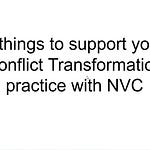In interpersonal tensions, it can be helpful for anyone who senses or who knows their actions have impacted someone else to be the one who starts the conversation. These possibilities range from the more tentative enquiry, towards a clearer understanding that the conversation was hard.
(tentative enquiry) “I’m reflecting on what I said yesterday, how was that for you?”
(clear there was impact on the other person, giving space for them) “I’m guessing that was hard yesterday … do you want to talk about it?”
(I regret what I said) “I’m regretting what I said yesterday, would you let me know how it was for you?”
However, you can only walk towards these kinds of connection or accountability conversations if you are grounded in a sense of self-worth. You need to believe that you might have messed up but that you are safe and you still belong.
If you have had a punitive conditioning or education anywhere in your personal history (and we all do!) you will believe that you must be punished if you have messed up. You are likely to also blame the other person for having caused the situation as a way of avoiding this punishment.
If you are stiffening when you think about what happened in the previous conversation
If you are avoiding the person
If you are blaming the person
If you are numb and reluctant to reflect on it
Ground yourself. Feet on ground, imagine roots holding you here on earth
Breathe gently and consciously. Paying attention to your cycle of breath for 3 breaths or 5 breaths or 10 breaths
Even when I make mistakes, I am safe.
Even when I make mistakes, I belong.
When I make mistakes, I learn and grow and become more fully human.
I am a human being, I am imperfect. I am a perfect imperfect human.
You can look at and release the unconscious contract that causes you to have the response you are having.
The contract will be something like ‘I swear that I will believe I should be outcast if I make a mistake.’
Check with yourself if you really believe this.
Then intentionally release the contract eg ‘I release this contract’
Set a new belief ‘Instead I believe that I can repair my mistakes and I can still be safe and belong’
Tap through energy points as in the EFT modality with a ‘I restore the right energy, balance and flow to …’ You can experiment with naming the old belief and the new intention and see which one works for you in the moment. For example, “I restore the right energy, balance and flow to ‘I should be punished’” (old belief)
“I restore the right energy, balance and flow to ‘I can repair my mistakes’” (new intention)
“I restore the right energy, balance and flow to feeling safe” (new intention)
All of this in addition to what Nonviolent Communication helps us with in the conversation itself, a clear observation, expressing and hearing feelings and needs, rather than opinions and judgements, and a ton of connection requests, to stay connected with the person in front of you.








Share this post